In the blog series XYZ with Q, Quanzhi “Q” Guo ’18 visits current and former Benton Scholars to learn about their interests, passions, and accomplishments. In the fourth installment of the series, Q makes pumpkin cream bread with Oneida Shushe ’19 and Meghan Byrnes ’19, who are involved with BreadX, one of the first-ever free online course designed by students for students.
One tablespoon science, one pinch cultural perspective, and two cups current issues yield batches of fun.
BreadX: From Ground to Global, one of the first-ever free online courses designed by students for students, is going live on the edX Edge platform on November 15, 2015. (Registration is open.) To get a taste of the course and preserve some fall flavors, I joined Benton Scholars Meghan Byrnes ’19 and Oneida Shushe ‘19 in the kitchen as they prepared pumpkin cheese bread.
Born in Albania and raised in Albany, NY, Oneida’s all-time favorite food is homemade white bread—the kind with a satisfying chewy crust and a soft texture on the inside. Under her instruction, I poured pumpkin purée into a mixing bowl while Meghan, a club-volleyball player from Syracuse, beat the cream cheese together with flour, sugar, and eggs.
This semester, both of them are enrolled in the Benton Scholars’ first-year seminar called Emerging Global Challenges. Developing the course has been an adventure. Working in five groups, each of the fourteen Benton Scholars has conducted research in a specific topic area, produced videos, and designed questions and activities pitched primarily for middle school-aged students, but appropriate for all ages.
“Before choosing the topic, we gave presentations on global issues we are passionate about, including the poverty cycle, global food supplies, industrial farming, water supplies, gender roles, and global warming. Then we realized that all of these challenges could be explored through the lens of bread,” Oneida said.
The class is primarily project-based. Groups meet twice a week during class seminars to update each other on progress and modify the project’s direction. “I have never taken a class that is so heavily student-run before,” Meghan said as she spooned the cream cheese batter on the pumpkin layer. Her role in the project is to construct the subtopic “Bread Distribution,” which explores bread’s environmental and socio-economic impacts. As a member of the educational structure group, Megan also ensures the logical flow and unity of the course.
BreadX is designed to run for ten days. During each chapter, registered students will conduct their own research and lab experiments at home, do short readings, watch interesting video lectures (many made by the students), complete comprehension questions, and participate in a wide variety of online discussions.
“We want to get students engaged and interested with the material and connected to their fellow students,” Meghan said. “Activities are to get students really work with the material rather than just watching the videos online. We also encourage students to go out and explore the relevance of issues we talk about in their own towns.”
“We are not only spreading knowledge, but also encouraging participants to think about how they can apply what they learn in our course to the real world, which is a very valuable skill.” Oneida said.
As we waited for our bread to rise, I thought about Thoreau, who held a daily ritual of baking over an outdoor fire in Walden: “to affect the quality of the day, that is the highest of the arts.” It seems cool to make and eat bread for a class, but being able to shape an emerging technology and pedagogy, like the edX platform, is even cooler.
Associate Professor of Geology Karen Harpp who teaches the class envisions the course as a community experiment in global online course development. “We are asking everyone who participates (online) to become an active collaborator by giving us feedback about the course, after each lesson. We want to know how we might improve the educational activities and how we can make the experience more dynamic and effective next time around,” she said. “With this highly interactive and student-centered design, we want to push the frontiers of online education both for the students in the classroom and for the participants beyond the institution.”
In the spring of 2015, I took her popular class for students and alumni—the Advent of the Atomic Bomb. Through video presentations (called fireside chats), discussion forums, video conference calls, a Twitter role-play project re-enacting the war in “real time,” and a trip to Japan, we explored the history, science, and ethics behind the decision to drop the A-bomb. Colgate alumni were integrated with the students in the course through online technology on the edX platform.
Rather than replacing the physical classroom, as most MOOCs(Massive Open Online Courses) do, Karen has been using technology to enhance in-person learning. “This course is about getting students to think innovatively, explore how we learn and how we can learn better, figure out how to reach people beyond the classroom, and try to make a positive impact on the world, all of which are made possible by going online,” Karen said.
To spread their aspiration to think globally and act locally, the Benton Scholars are reaching out both to local schools, including the Hamilton Central School, and to schools back home. “Our goal is to make more people aware of the global challenges our world is facing today. We explain what people can do on a local level throughout the course to encourage activism in local communities,” Meghan said.
With a sweet aroma wafting out of the oven, and the course launch date in sight, I asked my baking mates what they’ve learned so far.
“I think it teaches us a lot of skills that we will use later in life, no matter what we do,” Meghan said as she slid out a tray of golden pumpkin-ey loaves.
“The project has definitely made me more appreciative of the arts of video making, graphic design, communication, and teaching,” Oneida added.
From the first unleavened breads around 30,000 years ago, to the loaves of pumpkin bread I was cutting, bread has evolved with human civilization. Despite its various forms and the modern assault on carbs, it has remained the most widely consumed food—a comfort for both heart and soul. Since the emergence of massive online courses in 2012, I have witnessed and experienced many ideas and innovations in higher education. From Minerva, which strips away brick-and-mortar classrooms, to the SPOCs (Small Private Online Courses) Colgate has developed, each model has its own niche and potential. Perhaps we just need the patience and self-assuredness for it to “cook” and “cool”. As I finally devoured my moist and scrumptious bread, I was convinced that BreadX will have a delicious impact.


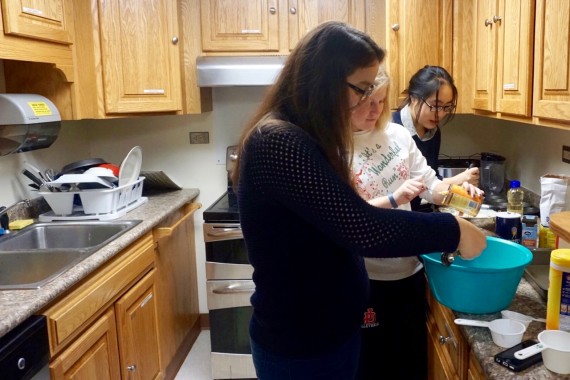
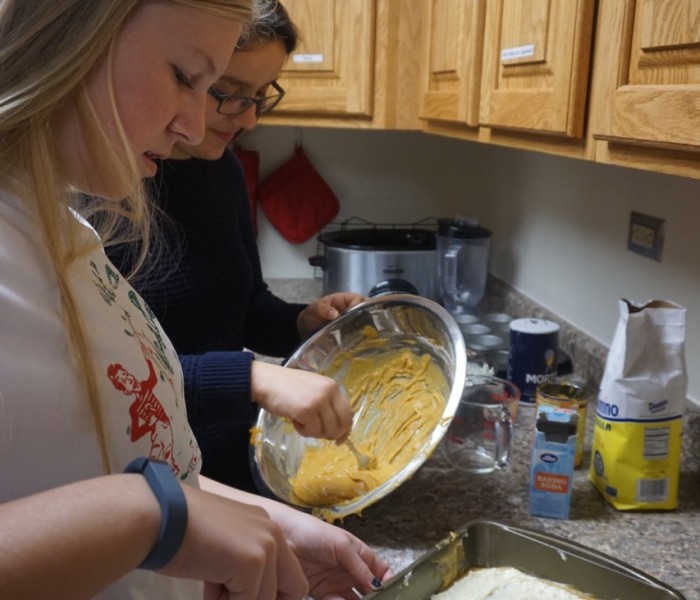
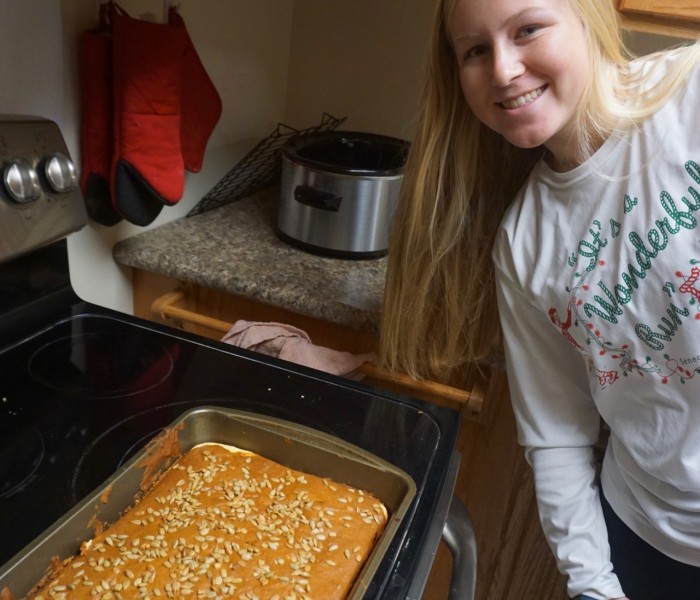
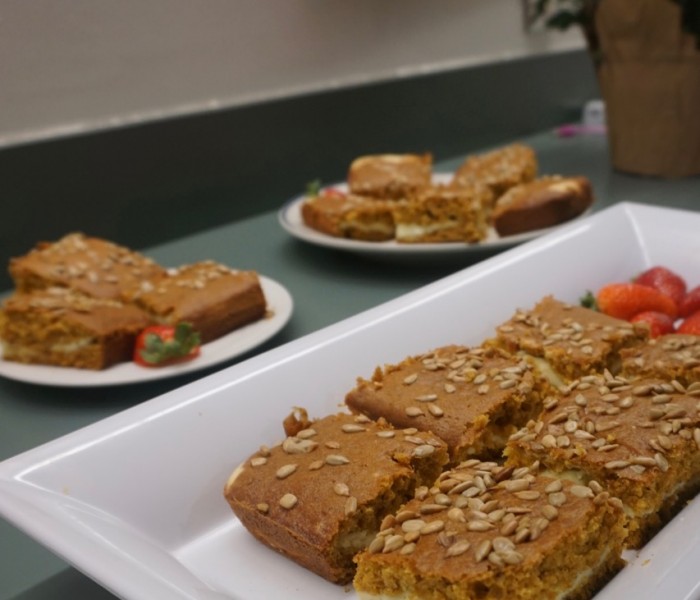
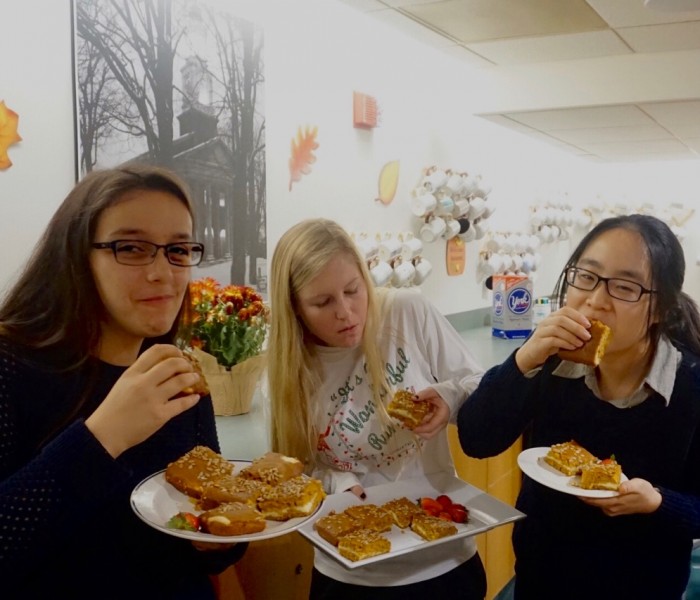
Great post, Q!